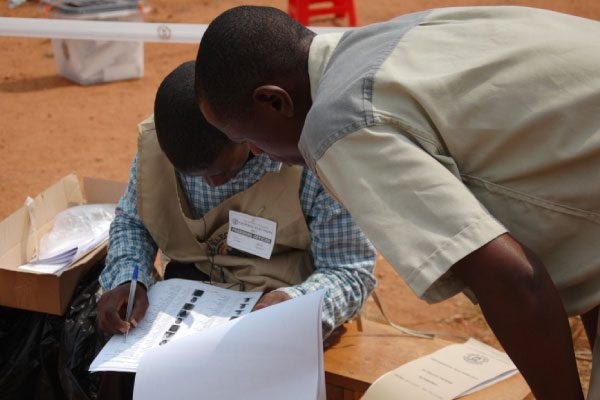
Kampala, Uganda | THE INDEPENDENT | The Electoral Commission has officially launched an important initiative in preparation for Uganda’s 2026 General Elections: the voter registration and National Voters’ Register update. This process offers new and existing voters the chance to verify and update their details, ensuring their eligibility to vote in January next year.
According to the Electoral Commission, the general update of the National Voters’ Register will be conducted at update stations in each parish, typically at locations where voting stations are situated, or at venues agreed upon by local leaders and Electoral Commission parish supervisors. The process, which started Monday, January 20, will run until February 10th, operating daily from 8:00 am to 6:00 pm, including weekends.
Julius Mucunguzi, the Head of Public Relations and Spokesperson for the Electoral Commission, the process is open to all Ugandan citizens aged 18 and above, whether they are registering for the first time or updating their details. He emphasized that the registration will follow a self-reporting procedure.
“The registration process is designed to be straightforward and simple,” Mucunguzi said. “Individuals intending to register as voters will need to visit an update centre in person, where they will provide their details, have their photograph taken, and their signature and fingerprints captured.”
For new voters, Mucunguzi stressed the importance of bringing their National Identification Number (NIN) to confirm their identity. He also stated that the same persons should present their parents’ NINs. If the parents are unavailable, the voter must provide proof of residence, such as a letter from the local council confirming their residency.
For those wishing to confirm that their details are correctly captured, the Electoral Commission offers a convenient way to check by visiting their website and entering their NIN to view their information.
The update exercise also allows registered voters to verify that their details are accurately reflected in the Voters’ Register at the polling locations they selected during registration. Additionally, voters can confirm the accuracy of their information and correct any errors found.
For those unable to access the website, which are the majority given the fact that internet use in Uganda is still very low, the Voter Register will be displayed at each polling station update centre within the respective Parish.
If any errors are identified, voters are advised to inform the registering officer, who will make the necessary updates after reviewing the supporting documents provided.
A document posted on the EC website clarifies that registered voters can only make corrections to minor errors, such as spelling mistakes, gender discrepancies, or mismatches in their photograph.
“For clarity, such voters will not be able to change their age or date of birth, or add new names,” the document states.
Transferring voter location
One of the more complex aspects of the update process is the application for a transfer of voting location. This may require individuals to visit their previous voting station, provide details of their former location, and submit additional documents, such as a local council letter confirming their origin in that area.
Mucunguzi explained that, when applying for a transfer, voters must also provide documentation to prove they are residents of the new voting location. Proof of residency must be presented, which can be confirmed by the local residents and leaders in the area.
Those wishing to transfer their voting station must be physically present at any of the update centres where a registration kit will be stationed. Learners previously registered by the National Identification and Registration Authority (NIRA) who have turned 18 will have their status automatically updated, and they will be assigned a polling station within their parish. These individuals do not need to re-register but are encouraged to visit an update station with their NIN.
Additionally, special interest groups, such as youth, persons with disabilities (PWDs), and older persons, will have their Voter Registers updated to ensure proper representation in the upcoming elections.
Why the Process is Critical
Eric Sabiti, the Head of Litigation at the Electoral Commission, emphasized the importance of the voter registration update, stating that it allows citizens who have turned 18 to register and gives existing voters a chance to correct inaccuracies in their details, particularly their names.
“This exercise also allows individuals to change their voting location if they wish, such as transferring from Kampala to Rwampara. Voters will be given forms to fill out at the voting centres for this purpose,” Sabiti explained.
Sabiti added that participation in the process is also essential for anyone wishing to vote or stand as a candidate in the 2026 elections. He noted that in previous elections, several candidates were disqualified for not being registered voters in the constituencies they intended to represent.
Sabiti also referenced a high-profile case in 2016, when the current Minister for Constitutional Affairs and Justice, Nobert Mao, was disqualified from running for MP in Gulu due to a failure to update his details in the voter register.
“Mao had intended to stand for MP in Gulu, but he was disqualified because he had not updated his details. Although Mao later petitioned the Constitutional Court, it was long after the election cycle had passed,” Sabiti said.
***
URN
 The Independent Uganda: You get the Truth we Pay the Price
The Independent Uganda: You get the Truth we Pay the Price




Por ejemplo, cuenta con filtros reversibles y con bitácoras para transparentar el video-estudio.
40% of Business Owners Switch Accountants—Let’s Help You Keep Yours!
Business owners are always looking for ways to reduce their tax burden, and overlooked credits are a major reason they switch accountants. Instead of losing clients over missed opportunities, let’s help you retain them—while boosting your bottom line.
– Strengthen client loyalty by delivering more value
– Unlock new revenue streams—we do the heavy lifting
– Leverage our proprietary AI to uncover hidden tax credits
Join the CPAs already partnering with NestWorth to maximize client savings and grow their firms. Let’s set up a quick call to explore how this can work for you!”
Let us know your thoughts.
– Chris